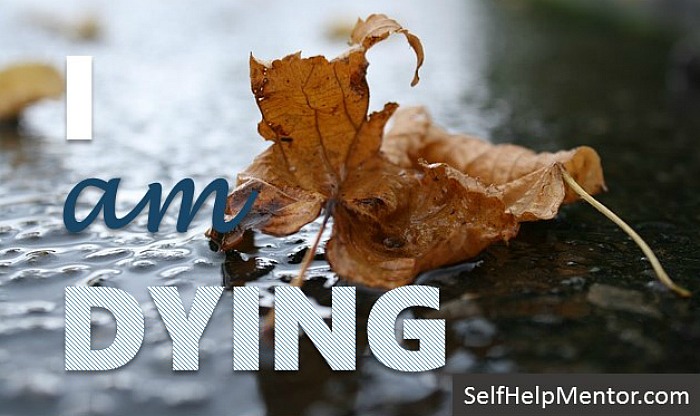Or, I Am Dying And Here’s Some More Bad News: You Are Dying Too!
I am dying.
Although doctors are 100% certain of the fatality of my diagnosis, they are very uncertain about the specifics.
They do not know exactly which ailment will kill me and they do not know exactly when.
Their best guess is that I will die about 40 years from now. But they cannot rule out a year from now, a month from now, a week from now, tomorrow… or quite shockingly, they cannot even rule out today as the day that I will die.
Now if this death sentence of mine weren’t bad enough news for you to digest right now, I’ve got some more bad news. Bad news that is sure to hit you a thousand times harder than the news about my impending death.
You are dying!
You may know something specific about your health that gives you a better guess as to the likely timeframe of your impending death.
“Wanna wrestle?”
If you don’t know any specific information, I can tell you that the most likely time has a lot to do with your current age, heredity factors, and the decisions you make on a daily basis such as what you eat, how much you exercise, and whether or not you engage in risky behavior such as smoking, drunk driving, texting while driving, motorcycling (34 times greater risk of dying per mile traveled than in a vehicle), coal mining, piranha spear-fishing, and/or alligator wrestling just to name a few.
And just like for me, the most brilliant doctors on the planet cannot declare with certainty that you will live long enough to finish reading this sentence.
Hey, are you still alive? Whew. Congratulations. You lived to see another few seconds.
So what should we do with this fatal diagnosis we both share?
How are you going to react to this death sentence I’ve just laid on you?
Are you going to treat it with any sense of urgency whatsoever?
How much serious attention are you going to pay me?
If I put on a white coat, met you in a big white building, and said it was “cancer,” I bet I could get your attention.But what if all I can tell you is that it is “something.” It is definitely something.
Now, how will you react?
Before You Answer, Let’s Discuss Cancer For A Minute
The way that people react to a cancer diagnosis greatly affects their chances of dramatically prolonging their lifespan.
For example, if you are told you have breast cancer and simply blow it off, your likely lifespan is not so great.
On the other hand, if you are told you have breast cancer and then follow the advice of the best breast cancer experts as to whether or not you should have surgery, chemo, and/or radiation to treat your cancer, your chances of increasing your lifespan are dramatically better than those who just blow it off.
In other words, taking your cancer diagnosis very seriously and making some radically different decisions about how you spend certain portions of your future time pays huge dividends.
By “radically different decisions” I mean, for example, that lying on a hospital table and having a doctor knock you out cold with anesthesia drugs and then slice your body open is a radically different way to spend your day than lying on a couch and watching another episode of The Real Housewives on Bravo.
So taking a cancer diagnosis seriously and then making specific, radically different decisions about how you spend certain parts of your future days makes a huuuuuge difference in you prospective lifespan. But you probably already know that, right? That’s a fairly well known and widely accepted fact by most people inside and outside of the medical community.
But cancer is a specific diagnosis. What about people who are given non-specific diagnoses of the kind that I have just given to you?
What if an insightful blogger tells you that you are dying, but he doesn’t have a specific diagnosis to give you?
Think about that for a second.
I am here to tell you something very important, right here, right now.
I am here to tell you a fact that even your very own doctor may not have shared with you.
Here is this startling, but rarely mentioned fact: The differences between how people react to a “non-specific diagnosis” are often just as dramatic and impactful as the differences in how people react to a “specific diagnosis.”
If you react by simply blowing it off, your lifespan might very well pale in comparison to the significantly prolonged lifespan of a person who receives this non-specific diagnosis and then radically alters the way they spend important parts of their future days.
But here’s the great news: The action differences that make such a dramatic lifespan difference after one receives a “non-specific” life-threatening diagnosis are usually much less dramatic, much less radical, than the altered actions required after a “specific” life-threatening diagnosis.
Swapping out some fried fast food for a Tofurky sausage sandwich, for example, is nothing compared to swapping out a day of no chemo for a day of chemo.
Swapping out half an hour on the couch for half an hour of scenic hiking is a breeze compared to swapping out normal toileting for your newest, bestest buddy—the colostomy bag.
Not texting while driving is a walk in the park compared to not texting because you are paralyzed from the neck down.
And putting out that cigarette is a lot easier than pulling around that oxygen tank as your perspire from the strain of trying to squeeze just one more day’s worth of air into your disintegrating lungs.You think I’m exaggerating the importance of a “non-specific diagnosis” as compared to a “specific diagnosis?” Well chew on this fact for a second: The average lifespan difference between smoking and not smoking (which is 10 years!) is actually greater than the average lifespan difference between someone who receives a prostate cancer diagnosis and then immediately sticks their fingers in their ears, stands up, walks right out of their doctor’s office and never returns vs. someone who receives a prostate cancer diagnosis and then follows their doctor’s advice to a tee.
Non-specific diagnoses matter.
So It’s Decision Time
Big decision time.
No, strike that. Big, big, big, big, big decision time!
The difference between life and death decision time.
Everything is at stake.
Everything.
There are certain days, months, and years on future calendars where what is happening on those days is not yet certain. Those days on those calendars might be days that your heart is beating.Or they might be days when it is not.
And what is very likely to make all the difference in that epically important binary outcome is how you react to the following notification:
You are dying.
Yes, you.
It is happening.
It is really happening.
This is not a dream.
This is your real life.
The news you are receiving from me today, unfortunately, is real. Very real.
I am here to tell you right now, right here, in no uncertain terms, that you are dying.
Your reaction to this information will make all the difference in whether you die sooner…
…or later.
Just like for all the women on this planet who found out this morning that they had breast cancer: It’s decision time.
I can bet with fairly good accuracy on how they will react.
The only thing I’m left wondering is:







